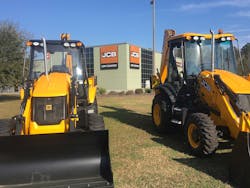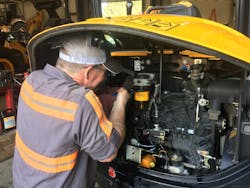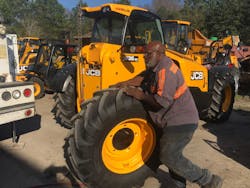Diversification, “Extras” are Dealer’s Stepping Stones
Chris Shea, 38, president/CEO and owner of Low Country Machinery, a JCB dealer in Pooler, Georgia, parlayed a job behind the parts counter into his own dealership, growing it steadily.
“When I was young, my dad was a railroad man, and for side money, he always bought and sold tractors and equipment,” Shea says. “So ever since I could remember, we would buy an old farm tractor, fix it, paint it up and get it ready, and put it out by the road to sell it.”
Years later, after graduating from Georgia Southern with a business degree, Shea knew he wanted to sell construction equipment or tractors.
Shea is a member of the Under 40 in Construction Equipment, Class of 2017. This is another in a series of profiles highlighting some of the past winners.
He walked into what was then JCB of Georgia cold, seeking a job.
“What I did was talk my way into the door here, but they said, ‘We don’t have a sales position open, but we have a parts position, and if you can get your foot in the door, maybe something can become available.’”
Shea was hired for the parts department in 2004, and he loved it.
“I was there for about six weeks and a position came open in the sales department, and when I came into the sales department, I sold my first machine on my first day,” he says.
“It was a skid steer,” Shea remembers. “It was off to the races at that point.”
Enter or nominate for the 2019 Dealer Excellence Awards here.
Twelve years, a lot of hard work, diligent investing, and one Great Recession later, Shea bought sole ownership of the dealership. “JCB has been very good to me, and that’s our most profitable side of the business, but I knew I needed to diversify.”
Shea brought on the Massey Ferguson tractor line, Scag mowing equipment, and grew Low Country’s rental and sales fleets. He also bought a Kubota dealership in Statesboro, Georgia. He saw every piece as a progression for his dealership and his customers.
“Being a single-brand dealership where all we had was JCB, we didn’t have a walk-in business where people just walked in off the street; you had to go get that business,” Shea says.
“The landscaper today, at one time he was the person who was mowing the grass in his early 20s, and he didn’t have much more than a pickup truck,” Shea says.
“And then he got a contract with someone to start laying sod. And then he grew that, and he got a crew,”
Shea says.
“So we brought on the mowers, and we have a lot of landscapers who come in and buy lawnmowers from us,” he says.
“Well, those landscapers, in a year or two, they’re going to be buying skid steers and mini excavators. If they’re coming to us already to buy those Scags, you know that they’re already comfortable with us and we have that relationship,” Shea says.
“Normally, they don’t just jump into a $50,000 skid steer; they go from a zero-turn to a small tractor with a front end loader on it to do landscaping,” Shea says. “That might cost $25,000. And then their next purchase is going to be that skid steer or that mini-excavator. These are stepping stones. I knew I had to create stepping stones in order to get that complete customer base.”
The results have been spectacular. In 2016, when Shea took over, Low Country did $9 million in sales. In 2018 when he closed the books, the dealership did $28 million. “It’s a little bit of investment and surrounding yourself with good people,” Shea says.
Now Shea is concentrating on selling extra services to his customers in the form of telematics, maintenance contracts, and extended warranties. It can be a step-by-step process. The first thing he usually has to introduce is telematics.
Buying in on telematics
In selling JCB’s LiveLink telematics, he uses an example. “We had a guy come in, look at a 48 mini excavator, drive it around, and want to purchase the machine,” Shea says. “He asked about financing and everything.”
The customer told Shea he’d like to try financing through his local bank. “A couple of days later, we get a phone call from him. He said, ‘Hey, I’m sitting in my bank, can you fax over a sales order on the machine so they can process the deal?’ It happens all the time,” Shea says.
“We faxed over the sales order, he called back and said the bank was going to cut him a check into his business account, then he would just cut a check off his business account,” Shea says. “Again, this happens all the time. He asked if we could deliver the machine tomorrow afternoon, and my salesman says no problem, he’ll come deliver it and do a walk-around.”
The next afternoon, the salesman delivered the machine to the customer’s house, and did the walk-around in front of the customer and all his employees.
“Four or five days go by, and we get a phone call from the bank—the check bounced,” Shea says. “We called the bank back and they said the check didn’t bounce, it’s no good. The check’s stolen. So it was a scam from the get-go. At the time, I didn’t know that the 48 mini excavators came standard with LiveLink telematics, because [JCB] had not made the announcement yet,” Shea says.
One of the ways Shea put the word out about the stolen excavator was through Facebook. A JCB employee in the U.K. saw Shea’s post, over a weekend. “I saw a message that said ‘Call me.’ It had a telephone number, but I didn’t know who it was,” Shea says.
When Shea called the number, the JCB employee, who worked at one of the company’s plants, told him he had the machine located. The employee had accessed the computer system on the excavator, disabled it, and put “pings” on the machine where it was located.
“He had already put messages into my phone through LiveLink, so if the machine moved, it would ping me,” Shea says. “We had the cops and the tow truck there within 45 minutes. Last April, I had 5 guys break into my Kubota store in Statesboro. They stole $249,000 of equipment. Not one machine had [telematics] on it. They’re gone—nothing’s been located. We tell this story all the time.”
Shea says he has customers who use the system to measure production on machines, and monitor fuel usage and idle time. “And they can tell if one of the employees borrows the machine on a Saturday,” he says. “It’s an awesome feature to have. Take it from somebody who lost $250,000.”
Maintenance contracts
Telematics also features into the maintenance contracts Shea finds his dealership selling more of. “We’re wanting to grow it, but right now we’re probably selling maintenance contracts to 60 percent of the customers buying from us,” Shea says. “It’s one of those things where people are buying PM contracts, and extended warranties now where they wouldn’t buy extended warranties before. These are things in the last two or three years that we’ve seen a big movement towards.
“It’s because of the job market,” he says. “Just like us, it’s hard for people to find mechanics. Kids today don’t want to go to school to learn to be a mechanic; they want to go to school to learn to sit behind a desk. Mechanics are the biggest problem we have. It’s the biggest problem everybody has. And downtime is what costs these customers money. In the past, they’ve always had a mechanic on staff. Now they can’t get that person.
“[Telematics is] the biggest selling feature we have for PM contracts, especially when we sell to people who have 20 to 30 machines,” Shea says. “Unless they hire somebody to keep up with it, things go past their PM. With the LiveLink we have now, it’s great. A contractor over in South Carolina, before he calls us up and says, ‘Hey, listen, I have an error code,’ LiveLink’s already let us know he’s got the error code. And since he has a PM contract, we also know when he’s getting ready for a service. We set it up to where it pings us 50 hours before the needed service. Then we call him and say we know the machine is at this job site, we plan on coming this Saturday, and we just want to let you know your maintenance is ready. Most of the time he has no clue it’s ready.”
Leasing is also on the come, according to Shea.
“It’s crazy how this business has evolved,” he says. “When I first started selling in 2004, until probably 2012, I hardly leased a machine. I mean you couldn’t convince people to lease a machine. And now, everybody wants to lease. They want a machine for three or four years. They want you to do the service contracts, and they want full warranty, and in three or four years, they want another brand new machine, because they don’t want the headache of dealing with the Tier 4 problems.
“Everybody’s had Tier 4 with the DEF stuff,” Shea says. “They don’t want to have problems with that; when it gets to the point that they have to change the DPF filter, they don’t want to deal with that. And they don’t want to deal with the upkeep of a machine. Think about it, if you run a machine three to four years, you’re going to have to start putting tracks and undercarriage on it. So probably 80 percent of our heavy line products are now leased. Before, we didn’t lease at all. It’s a fixed price.”
Shea points out that a customer can buy a wheel loader from Low Country with a service contract and a full warranty for three years. “And all you have to do is put an operator and diesel fuel in the machine—everything else is handled. So you know what your fixed cost is per hour to operate, for three years.”
It’s the certainty and convenience that customers like, Shea says. And he’s big on maintaining relationships.
“Every deal I go into, every situation that we go into as a dealership, I make sure that I’m trying to do the best thing for both parties involved. I’m a Christian man, and I believe that if you do unto others as you’d have them do unto you, things are going to be okay.”
Low Country Machinery serves a roughly 75-mile area around Savannah, but Shea is considering expansion with a location in Charleston, South Carolina.
“That’s a tough market to go into,” Shea says. “When you start a business from the ground up, where’s the staff come from? I have my hands full down here. Who do you hire to go ‘be you?’ It’s tough. And it takes a lot of money to run a dealership. So we’re very fortunate with what we have right now. We’re growing with our agriculture side, and we’re growing with the JCB side. There’s still a lot of market to get here.”
Shea will likely do it. One step at a time.


